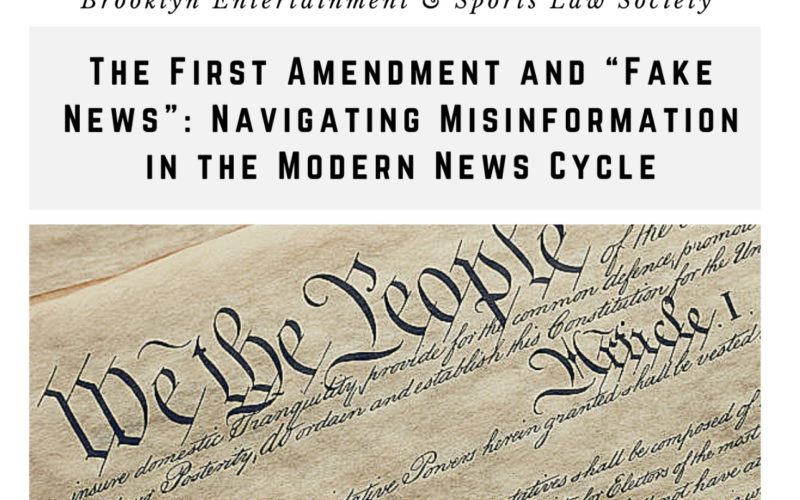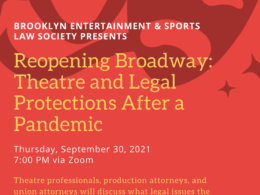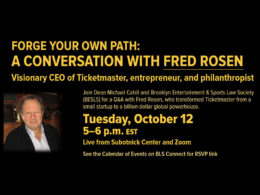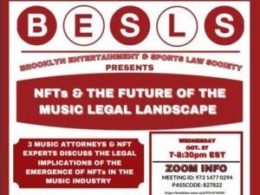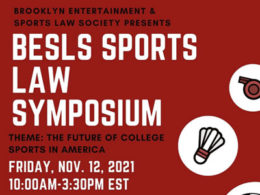On February 28, the Brooklyn Entertainment and Sports Law Society held its annual Film and Television panel, titled “The First Amendment and ‘Fake News’: Navigating Misinformation in the Modern News Cycle.” The panel was joined by Adrianna Rodriguez (VP and Assistant General Counsel at Univision), Celia Muller (Senior Counsel at NBCU News Group), Carrie DeCell (senior staff attorney at the Knight Institute), and Gary Tuchman (a CNN National Correspondent for Anderson Cooper 360), and was moderated by Professor William D. Araiza. The discussion centered on the ways in which broadcast news has adapted to the digital age, specifically concerning the ways in which the instancy of the internet and social media have affected the ways in which accurate news is produced and consumed.
Gary Tuchman reported for our panel live from outside a Ukrainian church, offering his perspective on how the news and the way in which the world interacts with the news has changed over time. The panelists were asked by Professor Araiza about the way that larger media companies handle First Amendment issues, and how new-age media like TikTok, Twitter, and other social platforms are connected with the news. Adrianna Rodriguez and Celia Muller explained the way their roles interact with the non-stop nature of broadcast news. Muller described the voluminous and rapid nature of information sharing in the modern era, likening it to drinking from a fire hose. When asked how easy dissemination of information affects their business, Muller, Rodriguez, and Tuchman all identified the heightened synergy between the legal department, standards and practices department, and reporters at these large news organizations. Muller described the standards and practices department as being made up of former reporters who serve as editorial guides of news organizations and ensure that transparency and accountability are prioritized in reporting. Rodriguez highlighted the training that many news companies prioritize on the front end, instructing reporters to work as efficiently and accurately as possible while in high-pressure, quick-paced situations. Tuchman emphasized accurate reporting as the core aim of these various practices and pursuits. Having any and all information available at our fingertips does have its setbacks. As the past few years have exhibited, filtering through scads of sources to find a neutral and accurate answer can occasionally feel like searching for a needle in a haystack. Arguably, this alone makes the role of the reporter more important than it has ever been in history.
The conversation then pivoted to a discussion of the role that the First Amendment plays within the scheme of misinformation and fake news on social media. Professor Araiza noted how online platforms like Meta and Twitter have begun to affirmatively curate the information Americans are now seeing, and asked DeCell what that affirmative curation meant in terms of First Amendment status. DeCell pointed to the fact that companies like Facebook, Twitter, and Instagram are all private, and are not subject to First Amendment restrictions. She added that despite this lack of traditional regulation, these platforms have immense power over public discourse and have the power to silence entire news organizations and sides of debate. DeCell introduced an ideology that is circulating within the legal community, which argues that these companies should be classified as quasi-governmental platforms because they have such a monumental impact on public discourse and public ideology.
Professor Araiza followed up and mentioned that these platforms function in an oxymoronic dual role as curator and as a passive bystander, immune from liability for the things that are published on their sites. This is largely due to protections afforded by §230 of the Communications Decency Act (CDA), which in part insulates online service providers from liability for content published by third parties on their platforms. Professor Araiza asked DeCell whether she believed there was a solution to this paradox of §230. While DeCell could not offer a bright-line solution to this important and contested question, she did note that the initial purpose of enacting §230 was to create a robust uninhibited internet while enabling the internet and websites to conduct content curation and moderation on their websites. She shared the perspective that the distinction between social media and traditional broadcasters do matter when it comes to really determining what news gets presented to the public, and that those differences should factor into the First Amendment analysis of the platforms themselves.
Ultimately, the battle against misinformation is far from over, but at this moment in time, we are seeing the power of the law and broadcast news organizations converge to stand up to this common enemy. Thank you to Adrianna Rodriguez, Carrie DeCell, Celia Muller, and Gary Tuchman for providing their incredibly relevant insight into the ways in which misinformation is regulated and combated in the digital age.
Written by: Henry Callander and Haley Zenenberg
Henry and Haley are 2024 J.D. Candidates at Brooklyn Law School
